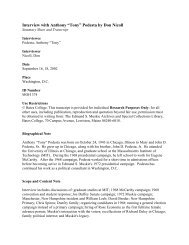Interview with Eliot Cutler by Andrea L'Hommedieu - Bates College ...
Interview with Eliot Cutler by Andrea L'Hommedieu - Bates College ...
Interview with Eliot Cutler by Andrea L'Hommedieu - Bates College ...
You also want an ePaper? Increase the reach of your titles
YUMPU automatically turns print PDFs into web optimized ePapers that Google loves.
precise, his approach to regulation was very specific and very precise. If you look at the Clean<br />
Air Act and Water Pollution Control Act and other acts that came out of statutes that emerged<br />
from his committee, they are very detailed, prescriptive statutes. And the other hallmark of<br />
Muskie's legislation and his approach was to invest in the, or to vest in the agencies that later<br />
collectively became the Environmental Protection Agency, EPA, regulatory authority, to create<br />
an agency whose mission was regulatory.<br />
Jackson's committee had jurisdiction over agencies like, for example, the Atomic Energy<br />
Commission whose principal responsibility was to build nuclear power plants, or to make, or to<br />
get them built, and various other emission agencies. And so Jackson, whatever conservation and<br />
environmental objectives Jackson had were somewhat confused <strong>by</strong> his desire to build more<br />
nukes. And Jackson took the approach to environmental matters that was marked <strong>by</strong> sort of<br />
policy pronouncements.<br />
So what emerged from the Jackson and Dingell efforts was something, a draft of a bill called the<br />
National Environmental Policy Act. Now, this was their effort to make a mark. They wanted to<br />
set U.S. policy, to establish U.S. policy in a broad way on environmental matters. And frankly,<br />
it was a bill <strong>with</strong>, as far as Leon and I were concerned and as far as Muskie was concerned, at the<br />
time, was sort of an annoyance. But Muskie claimed jurisdiction over it because he didn't want<br />
the bill to be enacted <strong>with</strong>out his committee having a chance to monkey <strong>with</strong> it. And so he got<br />
jurisdiction. That was a big fight and Jackson was pissed off about that, but Muskie's<br />
subcommittee got sequential referral, meaning that the bill, after it came out the Interior<br />
committee, had to come to Muskie's committee before it went to the floor of the Senate.<br />
Now this is a bill which became law, NEPA, and has become, I mean, and nobody at the time<br />
ever imagined that NEPA would be as important as it is today. Not important in terms of<br />
protecting air and water quality, but important in terms of governing the behavior of federal<br />
agencies whose actions affect environmental quality. The bill came to Muskie's committee. And<br />
the most important section in that bill was what has become <strong>by</strong> far the most important section of<br />
the statute was Section 102.2.c, subparagraph c of paragraph 2 of Section 102. And Section<br />
102.2.c was and is the requirement in NEPA that federal agencies who were taking a major<br />
federal, major action affecting, or having a significant effect on the environment, have to, the law<br />
now says, publish a statement about what they're doing. That's what an EIS is, that's what, the<br />
reason we had EISs, Environmental Impact Statements, is because of Section 102.2.c in NEPA.<br />
And this has become the focus of litigation for thirty, I mean, this is how projects get stopped,<br />
this is what, I mean it's been an incredibly important provision in litigation in the United States<br />
over the last thirty years, thirty-five years.<br />
When the bill came to Muskie's subcommittee, the requirement was that agencies who were<br />
taking a major action having a significant effect on the environment had to issue an<br />
environmental impact finding. Muskie fastened on the word 'finding' and he said, “This is<br />
wrong, you'll have the fox guarding the chicken coop,” this means that the Atomic Energy<br />
Commission and other emission agencies whose job it is to go out and build a road or build an<br />
airport or build a nuclear power plant will themselves draw conclusions about the environmental<br />
impact of the actions they propose to take. That's not what should happen. What should happen<br />
is they should disclose the facts about what they're going to do, and others <strong>with</strong> the responsibility



